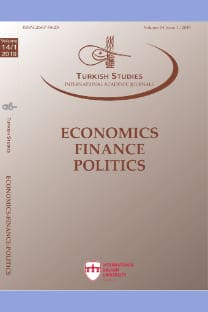Effects of Oil Prices on Capacity Usage: Panel Data Analysis for G-7 Countries
Petrol Fiyatlarının Kapasite Kullanımı Üzerindeki Etkileri: G-7 Ülkeleri İçin Panel Veri Analizi
___
Aykırı, Murat (2018). Enerjide Dışa Bağımlılık ve Sağlıklı Büyüme: Türkiye Örneği, Aydın İktisat Fakültesi Dergisi, 3(2), 50-67.Bayraç, H. Naci, (2009). Küresel Enerji Politikaları ve Türkiye: Petrol ve Doğal Gaz Kaynakları Açısından Bir Karşılaştırma, Eskişehir Osmangazi Üniversitesi Sosyal Bilimler Dergisi, Cilt.10, Sayı.1, 115-142. https://doi.org/10.17153/oguiibf.298720
BP (2009). BP Statistical Review of World Energy 2019, 68th Edition, https://www.bp.com/content/dam/bp/business-sites/en/global/corporate/pdfs/energyeconomics/ statistical-review/bp-stats-review-2019-full-report.pdf. https://doi.org/10.1177/014459878900700615
Breusch, Trevor S. & Pagan Adrian R. (1980). The Lagrange Multiplier Test and Its Applications to Model Specification Tests in Econometrics, Review of Economic Studies, 47: 239-53. https://doi.org/10.2307/2297111
Carrion‐i‐Silvestre, Josep Lluís & Barrio‐Castro, Tomás Del & López‐Bazo, Enrique (2005). Breaking the Panels: An Application to the GDP Per Capita, Econometrics Journal, 8(2), pp. 159-175. https://doi.org/10.1111/j.1368-423x.2005.00158.x
Cunado, Juncal & Gracia, F. Perez de (2005). Oil prices, economic activity and inflation: evidence for some Asian countries, The Quarterly Review of Economics and Finance, Vol.45, Issue 1, 65-83. https://doi.org/10.1016/j.qref.2004.02.003
Doğrul, H. Günsel & Soytas, Uğur (2010). Relationship between Oil Prices, Interest Rate, and Unemployment: Evidence from an Emerging Market, Energy Economics, Vol.32, Issue 6, 1523-1528. https://doi.org/10.1016/j.eneco.2010.09.005
DPT (2007). Dokuzuncu Kalkınma Planı, Petrol ve Petrol Ürünleri Sanayii Özel İhtisas Komisyonu Raporu, http://ekutup.dpt.gov.tr/imalatsa/öik669.pdf (11.08.2019).
Eberhardt, Markus & Bond, Stephen (2009). Cross-section Dependence in Nonstationary Panel Models: A Novel Estimator, MPRA, Paper No: 17692.
Energy Information Administration (EIA) (2019). Crude Oil Including Lease Condensate Reserves, https://www.eia.gov/beta/international/?src=apiviz (19.10.2019).
Ewing, Bradley T. & Thompson, Mark A. (2007). Dynamic Cyclical Comovements of Oil Prices with Industrial Production, Consumer Prices, Unemployment, and Stock Prices, Energy Policy, Vol.35, Issue.11, 5535-5540. https://doi.org/10.1016/j.enpol.2007.05.018
Gökçe, Cem (2014). Önemli Bir Enerji Girdisi Olan Petrolün Ekonomik Kalkınma Sürecindeki Rolü, AKÜ İİBF Dergisi, Cilt.XVI, Sayı.1, 143-153. https://doi.org/10.5578/jeas.7253
Hooker, Mark (1996). What happened to the Oil Price-Macroeconomy Relationship?, Journal of Monetary Economics, 38, 195-213. https://doi.org/10.1016/s0304-3932(96)01281-0
IEA (2019). Energy Prices and Taxes, http://data.iea.org//payment/products/111-energy-prices-andtaxes- quarterly.aspx (16.04.2019). https://doi.org/10.1787/data-00683-en
Im, Kyung So & Pesaran, M. Hashem & Shin, Yongcheol (2003). Testing for Unit Roots in Heterogenous Panels, Journal of Econometrics, 115(1): 53-74. https://doi.org/10.1016/s0304-4076(03)00092-7
İşcan, Erhan (2010). Petrol Fiyatının Hisse Senedi Piyasası Üzerindeki Etkisi, Maliye Dergisi, Sayı 158, 607-617.
McCoskey, Suzanne & Kao, Chihwa (1998). A Residual-Based Test of the null of Cointegration in Panel Data, Econometric Reviews, 17, issue 1, 57-84. https://doi.org/10.1080/07474939808800403
Müsiad (2006). Türkiye’nin Enerji Ekonomisi ve Petrolün Geleceği, Tavaslı Matbaacılık.
Karagöl, Erdal & Erbaykal, Erman & Ertuğrul, H. Murat (2007). Türkiye’de Ekonomik Büyüme ile Elektrik Tüketimi İlişkisi: Sınır Testi Yaklaşımı, Doğuş Üniversitesi Dergisi, 8 (1), 72-80. https://doi.org/10.31671/dogus.2019.243
Karhan, Gökhan & Aydın, H. İbrahim (2018). Petrol Fiyatları, Kur ve Hisse Senedi Getirileri Üzerine Bir Araştırma, Akademik Araştırmalar ve Çalışmalar Dergisi, 10(19), 405-413. https://doi.org/10.20990/kilisiibfakademik.454782
Şimşek, Nevzat (1998). Enerji Sorununun Çözümünde Jeotermal Enerji Alternatifi, Çev-kor, 8, 29, 15-20.
Papapetrou, Evangelia (2001). Oil Price Shocks, Stock Market, Economic Activity and Employment in Greece, Energy Economics, 23(5), 511-532. https://doi.org/10.1016/s0140- 9883(01)00078-0
Pesaran, M. Hashem (2004). General Diagnostic Tests for Cross Section Dependence in Panels, Cambridge Working Papers in Economics, 435.
Pesaran, M. Hashem (2006). A Simple Panel Unit Root Test in the Presence of Cross Section Dependency, Cambridge Working Papers in Economics, 0346.
Pesaran, H. Hashem & Yamagata, Takashi (2008). Testing Slope Homogeneity in Large Panels, Journal of Econometrics, 142, 50-93. https://doi.org/10.1016/j.jeconom.2007.05.010
Pesaran, M. Hashem & Ullah, Aman & Takashi, Yamagata (2008). A Bias-Adjusted LM Test of Error Cross-Section Independence, Econometrics Journal, 11(1), 105-127. https://doi.org/10.1111/j.1368-423x.2007.00227.x
Smith, L. Vanessa & Leybourne, Stephen & Kim, Tae‐Hwan & Newbold, Paul (2004). More Powerful Panel Data Unit Root Tests with an Application to Mean Reversion in Real Exchange Rates, Journal of Applied Econometrics, 19, 147-170. https://doi.org/10.1002/jae.723
Sodeyfi, Setareh & Katircioglu, Salih (2016). Interactions between Business Conditions, Economic Growth and Crude Oil Prices, Economic Research, Vol. 29, No. 1, 980–990. https://doi.org/10.1080/1331677x.2016.1235504
Şener, Sefer & Savrul, Mesut (2009). Türkiye’nin Enerji Sorunu Çerçevesinde Nükleer Enerjinin İktisadi Açıdan Değerlendirilmesi, Girişimcilik ve Kalkınma Dergisi, Cilt.4, Sayı.1, 57-89.
Türkiye Petrolleri (2019). 2018 Yılı Ham Petrol ve Doğal Gaz Sektör Raporu, Mayıs 2019, http://www.tpao.gov.tr/tp5/docs/rapor/sektor_rapor_2018.pdf (14.05.2019).
Westerlund, Joakim & Edgerton David (2007). A Panel Bootstrap Cointegration Test, Economics Letters, 97 (3): 185-190. https://doi.org/10.1016/j.econlet.2007.03.003
World Bank (2019). World Development Indicators, http://databank.world bank.org/ data/source/world-development-indicators, (20.10.2019). https://doi.org/10.1596/0-1952- 0788-2
- ISSN: 2667-5625
- Yayın Aralığı: 4
- Başlangıç: 2006
- Yayıncı: ASOS Eğitim Bilişim Danışmanlık Otomasyon Yayıncılık Reklam Sanayi ve Ticaret LTD ŞTİ
Gülay ÖRMECİ GÜNEY, Aslı KARATAŞ, KURTULUŞ BOZKURT
Küreselleşmenin Turizme Etkisi: OECD Ülkeleri Örneği
Türkiye’de Sağlık Bakım Finans Sisteminin Hakkaniyetinin İncelenmesi
Yatırımcı Aşırı Özgüvenine Yol Açan Faktörler: Pakistan Pay Piyasası Örneği
Fareeha Javed QURESHI, Murat ERTUĞRUL
ZAFER ADIGÜZEL, SERAP TEPE, Oya ERDİL
Effects of Oil Prices on Capacity Usage: Panel Data Analysis for G-7 Countries
Uluslararası İlişkiler Yaklaşımlarında Güvenlik Kavramı
Hisse Senedi Piyasası Gelişimi Ekonomik Büyüme Sürecinde Bir Rol Oynar mı? BRICS-T Ülkeleri Örneği
Turgut Özal ve AK Parti Dönemi Türkiye ABD İlişkilerinin Ekonomi Politiği
Örgütsel Özdeşleşme ve İşten Ayrılma Niyetinin Çalışmaya Tutkunluk Üzerindeki Etkisi
